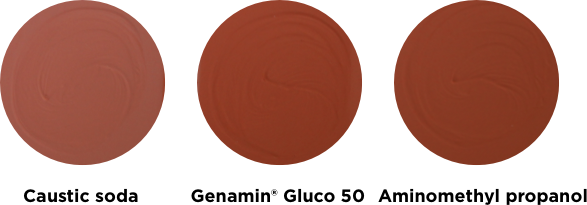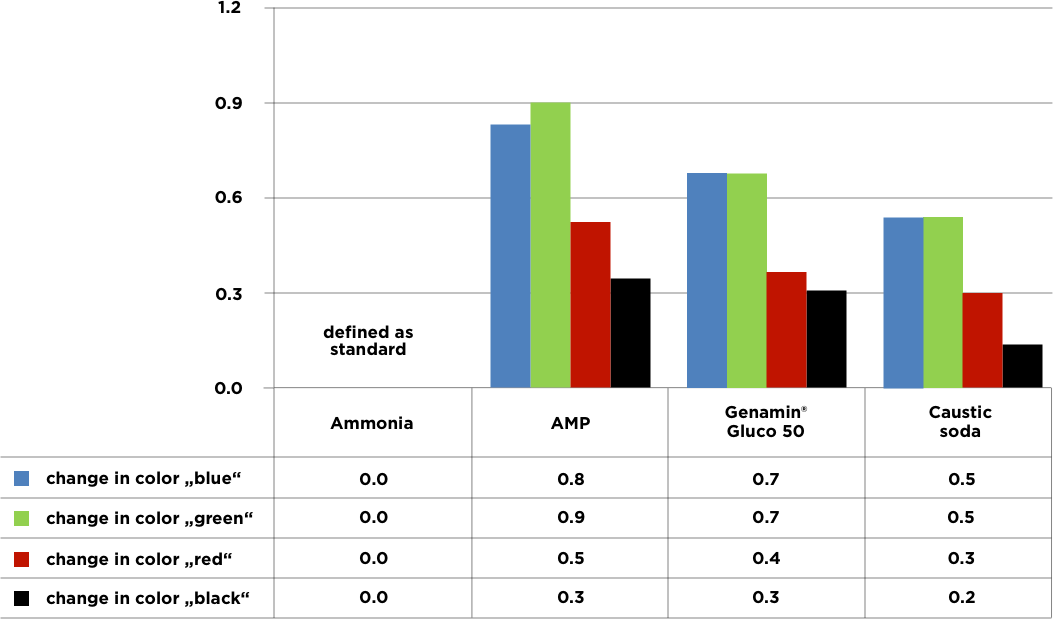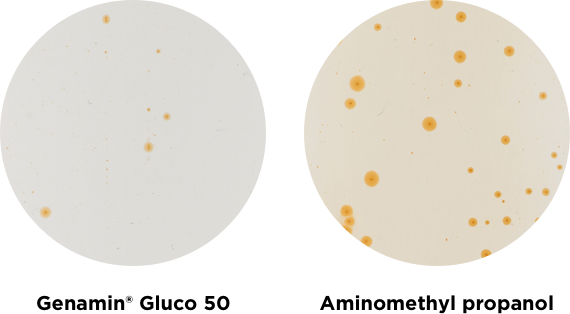Discover Genamin Gluco 50
How should we paint our future?

Bringing healthy colors
to our little ones
Protecting our children is what we do as parents. We don’t want to expose them to unsuitable surroundings. That goes for a kindergarten as well as at home. Children should be as carefree exploring indoors on a rainy day as they are out in the sunshine. So we need to ensure that their indoor world is safe and healthy.
Expert Hans-Achim Brand on the challenges of eco-friendlier paints
You have over 25 years of experience testing and evaluating paints & coatings. How have market requirements evolved?
Consumers are concerned more about sustainable living but also in how they select paint. In particular, interior wall paint. Those who are asthmatic or suffer from an allergy even demand a full list of ingredients. At the same time the demand for easier-to-use, convenient paints is rising and the industry is reacting. The challenge is to find solutions that combine performance and sustainability.

Hans-Achim Brand,
Head of CoellnCoat, an independent development laboratory for the paint industry
»Because of changing regulations and safety data sheets for existing additives, paint manufacturers have to constantly rethink paint compositions.«
What role do additives have in environmentally-friendly paints?
Consumer paint is composed of several ingredients. It is necessary to check every single one regarding its ecological impact and possible influence on personal health. This is true even for additives used in very small amounts, like neutralizing and wetting agents. Ideally, such an additive should not have any hazardous labeling or any volatile substances, while at the same time enhancing paint performance.Do today's most commonly used neutralizers on the market also meet the consumer standards of tomorrow?
From my point of view, each existing solution has some drawbacks. Caustic potash and caustic soda are corrosive and require a hazard warning. Aminomethyl propanol (AMP) and dimethly aminoethanol (DMEA) are regarded as volatile organic compounds (VOCs) because of their low boiling point. There are a few solvent-free amines on the market, but they do not perform like the most widely used product, AMP. And, of course, they are not based on renewable resources. Because of changing regulations and safety data sheets for existing additives, paint manufacturers have to always be rethinking paint compositions.What is a VOC and why is it a problem?
A volatile organic compound is a chemical which is volatile, like water or a fragrance. Some additives, for example defoamers or their constituents, are volatile. Very often VOCs are harmful or have at least questionable effects on personal health or the environment. The absence of solvents and VOCs is crucial for an ecolabel. Lastly, semi-volatile compounds (SVOCs), which evaporate over a significantly longer period of time, are in discussion. They could be even more dangerous than VOCs because of their long lasting presence in the ambient indoor air. A lot of paint manufacturers already have a solution for low-emission wall paints. But sometimes waterborne interior varnishes are not yet in compliance with the ecolabel regulations, such as the testing method ISO 16000-9 defined by the German AgBB1, a taskforce of the German public health authorities on the VOC emissions from construction products.1 Abbreviation of a German committee (Ausschuss zur gesundheitlichen Bewertung von Bauprodukten).

Hans-Achim Brand,
Head of CoellnCoat, an independent development laboratory for the paint industry
Two neutralizing agents - One winner in all categories
Neutralizing agents have to fulfill a lot of requirements with regard to performance, safety and eco-compatibility, while at the same time being in line with today's market trends and end-consumer needs. We compared Genamin™ Gluco 50 with AMP in 12 crucial categories.

1 VOC-free means the VOC content of Genamin™ Gluco 50 is below the measurable threshold of 0.1% according to ISO 11890-2. According to ISO 16000-9, Genamin™ Gluco 50 is also SVOC-free. 2 No human hazard label 3 No environmental hazard label
Two neutralizing agents - One winner in all categories
Neutralizing agents have to fulfill a lot of requirements with regard to performance, safety and eco-compatibility, while at the same time being in line with today's market trends and end-consumer needs. We compared Genamin™ Gluco 50 with AMP in 12 crucial categories.

1 VOC-free means the VOC content of Genamin™ Gluco 50 is below the measurable threshold of 0.1% according to ISO 11890-2. According to ISO 16000-9, Genamin™ Gluco 50 is also SVOC-free. 2 No human hazard label 3 No environmental hazard label
The years go by - the quality stays
Paint quality should last even after 2 years of being on the shelf. To ensure this, not only do sedimentation and syneresis need to be inhibited, but pH-value and viscosity must also be stabilized. How does Genamin™ Gluco 50 measure up?
The benefits at a glance
Multi-functionality
Genamin™ Gluco 50 not only adjusts pH value, but ensures a stable paint system, increases compatibility with other paint components, improves storage stability and inhibits flash rust.
Eco-friendly
Genamin™ Gluco 50 is the only renewable-based VOC/SVOC-free* and label-free specialty amine on the market.
Safe use
Genamin™ Gluco 50 is neither sensitizing nor irritating to the skin or eyes. Due to its pleasant smell, Genamin™ Gluco 50 is a suitable component for low-odor paints, thus satisfying the needs of health-oriented consumers.
Regulatory freedom
Genamin™ Gluco 50 has a very sustainable profile and is the ideal component for the paints of today and tomorrow, helping formulators replace ingredients that are under public scrutiny, such as AMP.
Ecolabel compatibility
Genamin™ Gluco 50 is suitable for paints with eco-labels, such as Blue Angel, Nordic Swan, EU Ecoflower and NF Environment.
* VOC-free means the VOC content of Genamin™ Gluco 50 is below the measurable threshold of 0.1% according to ISO 11890-2. According to ISO 16000-9, Genamin™ Gluco 50 is also SVOC-free.
Genamin™ Gluco 50 in numbers
Genamin™ Gluco 50 is suitable to replace commonly used neutralizing agents. Regarding dosing, only the water content needs to be adjusted in the formulation.
Technical data of Genamin™ Gluco 50
Active substance content Approx. 50 % Appearance at 25 °C Clear liquid Hazen Color Index Max. 230 Density at 20 °C Approx. 1.14 g/cm3 Viscosity at 20 °C Approx. 20 mPa•s pH value, 1 % in water Approx. 10.9 pKa-value 9.2 Tertiary amine content Min. 99.5 % Amine value 125-140 mg KOH/g Point of solidification -10 °C
Keeping the color of the paints
Dispersion paints as well as pigment dispersions that are neutralized with Genamin™ Gluco 50 show higher tinting strength in comparison to other neutralizing agents. Exchanging components in a tinted paint formulation can cause shade shifts.
Compatibility with pigments—tinting strength
Rub-out test of a dispersion paint tinted with a colorant based on a pigment red iron oxide, formulated by using three different neutralizing agents.

Compatibility with pigments—shift of shades
If ammonia is considered as a standard neutralizing agent and exchanged with Genamin™ Gluco 50, the shift of shades is comparable to AMP. It can therefore easily be replaced by Genamin™ Gluco 50.

Compatibility with pigments—shift of shades
If ammonia is considered as a standard neutralizing agent and exchanged with Genamin™ Gluco 50, the shift of shades is comparable to AMP. It can therefore easily be replaced by Genamin™ Gluco 50.

Dispersion paints as well as pigment dispersions that are neutralized with Genamin™ Gluco 50 show higher tinting strength in comparison to other neutralizing agents. Exchanging components in a tinted paint formulation can cause shade shifts.
Compatibility with pigments—tinting strength
Rub-out test of a dispersion paint tinted with a colorant based on a pigment red iron oxide, formulated by using three different neutralizing agents.

No flash rust, no discoloration
Genamin™ Gluco 50 in water-based lacquers is able to reduce flash rust on ferrous metals. The product also helps protect the coating film against discoloration which is often caused by rust. For gloss lacquers this is visually tested according to ASTM D610.
Flash rust inhibition
Evaluation of the influence of neutralizing agents on the flash rust inhibition

Genamin™ Gluco 50 knows what end-consumers need
Thanks to its pleasant smell, Genamin™ Gluco 50 is a suitable component for low-odor paints, thus supporting consumers’ need for healthier living environments. Additionally, it has a positive influence on brushability, allowing an easier paint application.
Odor evaluation
Average ranking of odor test with 30 persons, male and female mixed, no smokers.
Evaluation of brushability and leveling behavior


Genamin™ Gluco 50 knows what end-consumers need
Thanks to its pleasant smell, Genamin™ Gluco 50 is a suitable component for low-odor paints, thus supporting consumers’ need for healthier living environments. Additionally, it has a positive influence on brushability, allowing an easier paint application.
Odor evaluation
Average ranking of odor test with 30 persons, male and female mixed, no smokers.

Evaluation of brushability and leveling behavior

Want to know more? Let's get in touch
We’d really like to hear from you. Please give us a call or contact one of our professionals for more information about Genamin™ Gluco 50.

